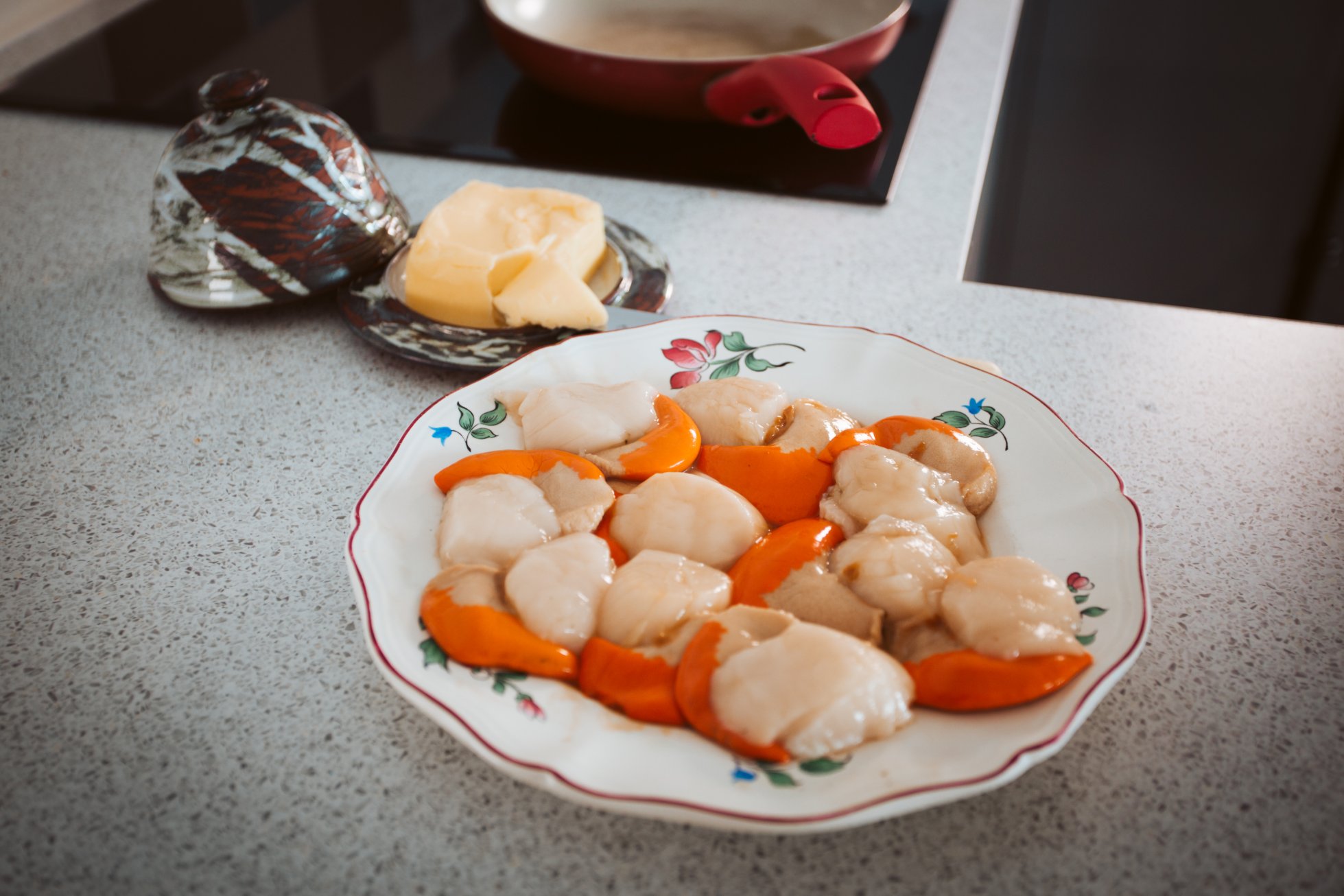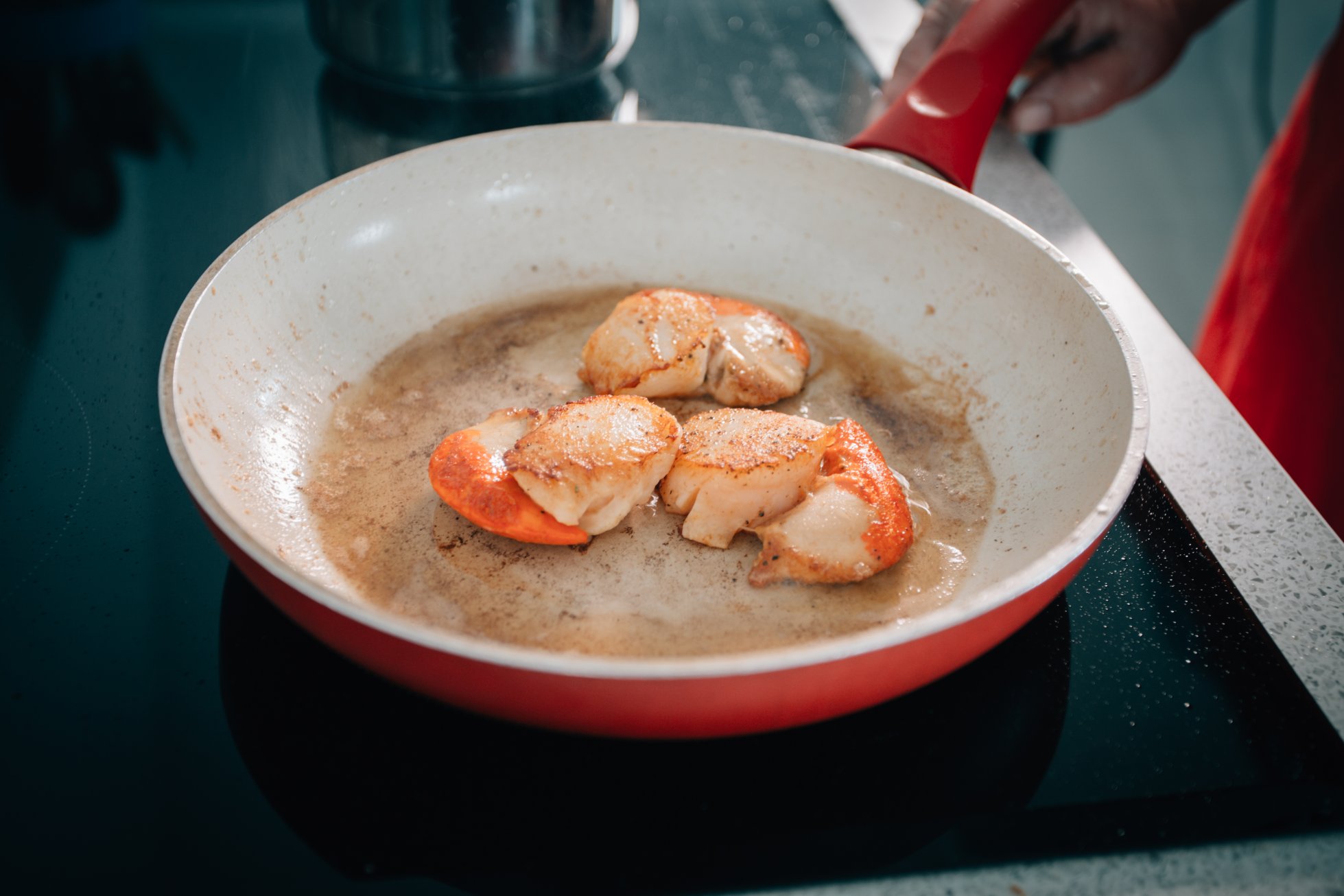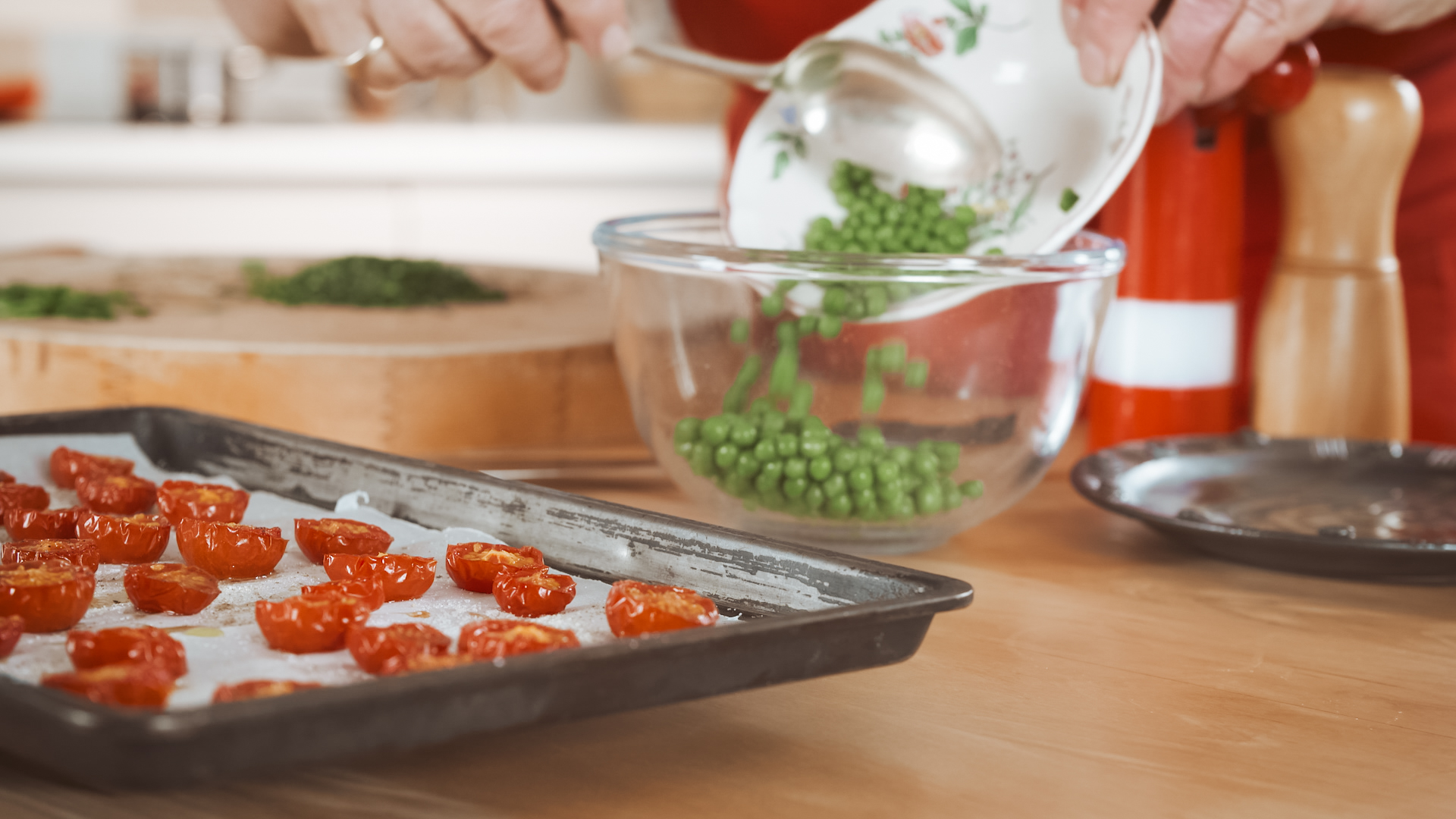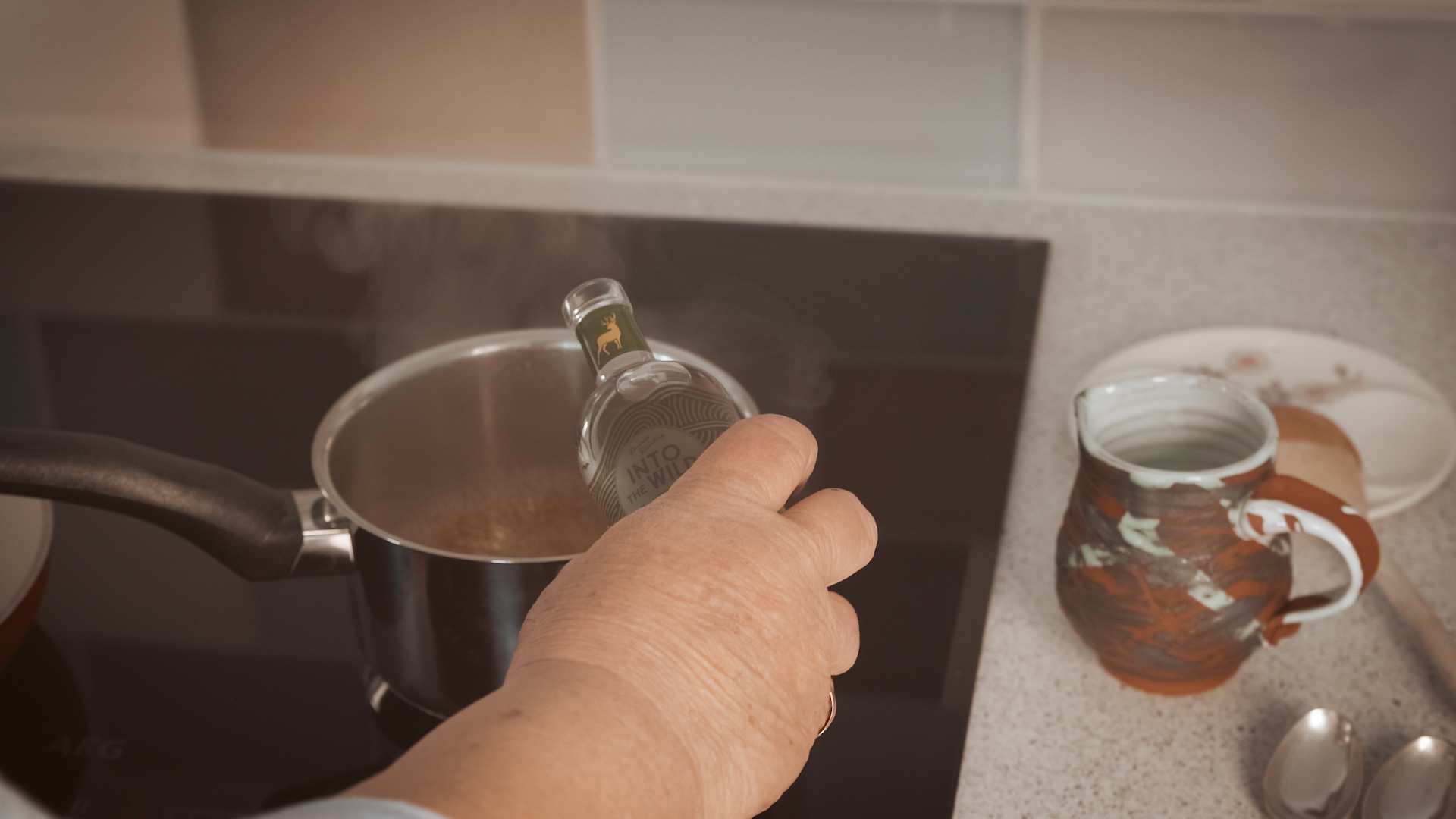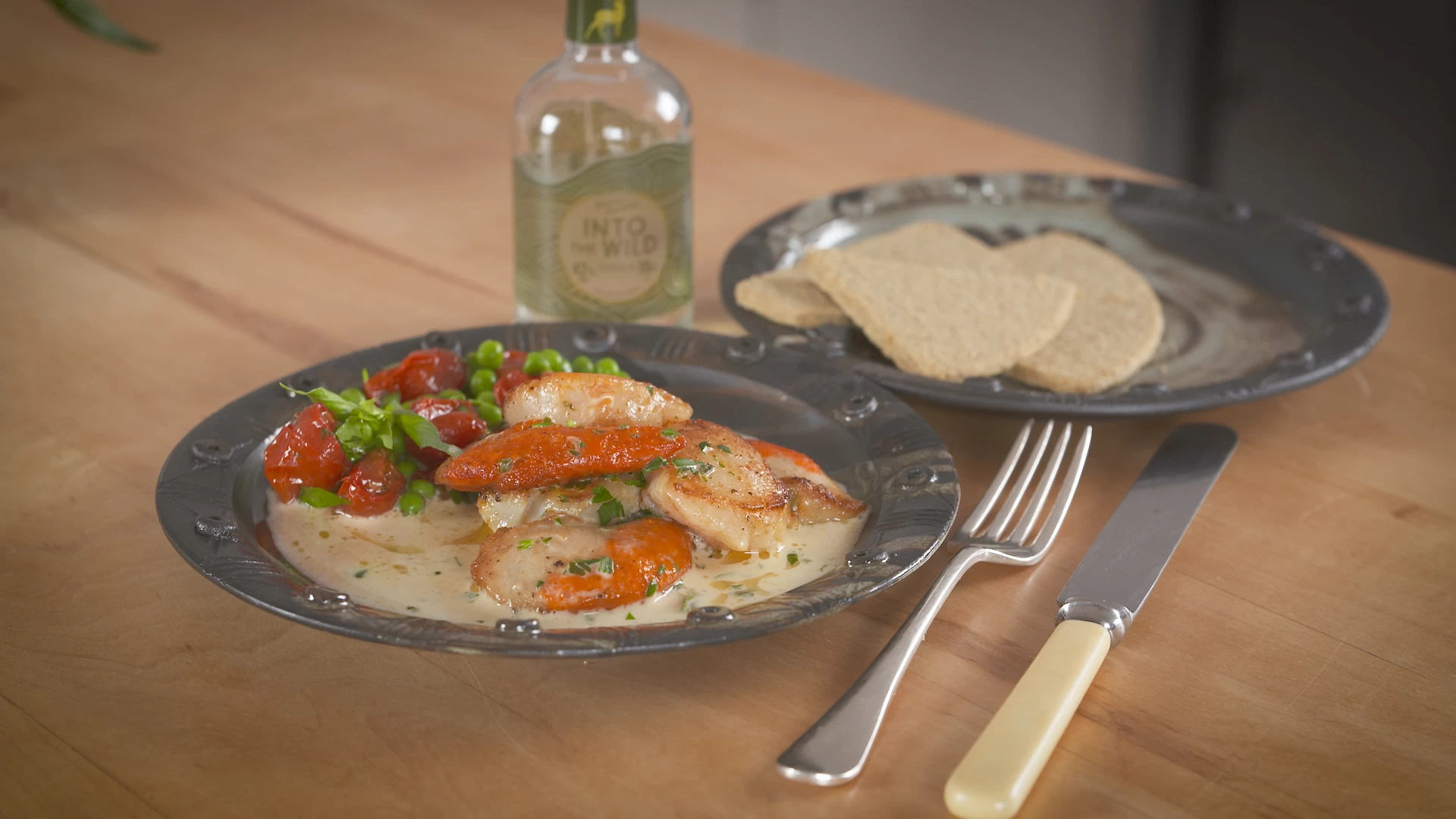Our regular food blogger Rosemary Moon has been sampling one of Orkney's finest products this month. Keep reading to try her recipe for yourself.
It took a photography group trip to Swona, one of Orkney’s deserted islands, to make me fully appreciate the brave divers who gather scallops by hand in Orkney’s oceanic waters.
Obtaining permission to visit the privately-owned island is one thing - getting there is the more difficult part of the equation. We hitched a ride with Magnus, a scallop diver who collects the sweet, plump, juicy molluscs which, once tasted, are remembered forever by locals and visitors alike.
The grading nets, empty on our trip out, were filling up with different sizes of scallops when Magnus collected us for our journey home. He and his mate had made two dives while we were busy with our cameras, but their catch was not yet sufficient to represent a good day’s fishing so we stopped in the middle of Scapa Flow for 30 minutes for the final dive of the day.
The first thing to strike us was how rough the water was once the boat was trying to stay still. Secondly, buoys and markers were needed to show where Magnus entered the water and therefore where we needed to be to collect him. His time on the seabed is critical for his health. A maximum of three dives a day is about all the body’s systems can take, and scallop collectors should not dive every day of the week. 20-30 minutes is the maximum time for a dive so working quickly is essential to gather enough to make a living. The diver needs a flare on his marker in case of separation from the boat for any reason. As my husband said after the trip, we should never take ‘hand-dived scallops’ for granted in a fish shop or on a menu - collecting them is a risky way of making a living.
Hand-picked, dived scallops are clean and mean good, non-gritty eating. Dredging, the alternative way of harvesting, damages the seabed beyond what nature dishes out from natural disturbances like storms, and the stirring up of the seabed contaminates the vast quantities of scallops that are taken in each sweep with sand and grit. Orkney’s scallops, like its crabs, lobsters and spoots (razor clams) are much sought-after for their sweet, clean eating. Once gathered, they are held in sea water tanks which are constantly flushed through so the scallops are therefore distributed as fresh as possible. When my chef friend Sam was staying, I had collected some scallops in the shell that morning and he was delighted that they were so fresh they were almost nibbling his fingers as he was cleaning them! To be in Orkney is to be truly spoiled by the freshness of our produce.
Most restaurants, in our high streets or in the islands’ hotels, will have scallops on the menu. I have feasted on them at The Lynnfield Hotel in Kirkwall, at The Sands in Burray and at The Hamnavoe in Stromness. To those establishments where I have yet to eat scallops, well, I’ll get to you soon! A recent wedding anniversary trip to The Lynnfield had me enjoying them on a lightly curried parsnip purée, with parsnip crisps and pomegranate - an edgy combination which actually was delicious with a dram of sherry cask-matured whisky, which pulled out the sweetness of both scallops and parsnips. Black pudding is often served as an accompaniment but I tend to prefer a fruitier flavour with the molluscs - I have had them cooked deliciously at The Sands, our local, with an orange sauce and also with butternut squash, which again releases the sweetness of the flesh.
The first time that I cooked scallops at home here in Orkney was with a salsa of oranges, mango, red onion and chopped coriander - they are amazingly versatile and well able to cope with strong flavours and innovative ingredient combinations.
Jolly’s, the Kirkwall-based smokery and fishmongers, usually have scallops for sale, either at The Brig Larder or at their shop in Hatston Industrial Estate. When I first came to Orkney some 15 years ago my colleague from Inverness would not take the plane home until he had some of Jolly’s Orkney scallops to take with him. If you are in or based at Stromness you’ll find fresh scallops at the Orkney Fishermen’s Society at Garson, with the shop clearly signed from the road. Jolly’s sometimes smoke scallops, and they are delicious either straight from the pack or quickly pan-fried in a little oil. I serve them on Stockan’s peedie oatcakes on a little blob of creme fraiche with a few drops of the Honey & Meadowsweet Orkney Craft Vinegar and a twist of black pepper.
My scallop recipe for you combines the sweet acidity of tomatoes with the slightly aniseed flavour of French tarragon and the bouquet of herbal aromas in the Deerness Distillery-produced Into The Wild vodka. Strangely, the vodka garners its flavour simply from the Scottish barley from which it is distilled and there are no botanicals in it - the magic must be in the Orkney water.
Scallops with tomato, cream and vodka sauce
I have used the clear water from the bottom of the roasting tin after roasting tomatoes for the basis of this sauce. Most people just throw it away but it is packed full of flavour. You could use 100ml tomato juice and 150ml water, but it will give a pinker sauce. You can also use fish stock with half a teaspoon of tomato paste.
Ingredients:
For the salad:
- Baby plum or piccolo tomatoes
- Sugar and olive oil
- Defrosted petit pois
- Chopped parsley or pea shoots
For the sauce:
- Fresh soft herbs: parsley, tarragon, chervil or dill - sufficient for 2-3 tbsp chopped herbs
- 250ml tomato liquor (see above)
- 50ml Into The Wild vodka
- 150ml double cream
Cleaned scallops: 3 per person as a starter, 5 as a main course
Butter and olive oil for frying
Method:
1. Prepare the salad. Preheat the oven to gas mark 3, 150C. Line a baking sheet with baking parchment and cover with halved tomatoes, cut side up. Sprinkle them with salt and pepper, a pinch of sugar and a drizzle of olive oil. Cook slowly in the oven for 45-60 minutes until soft, then leave to cool.
2. Combine the tomatoes with the defrosted petit pois, salt, pepper and chopped parsley or some pea shoots, and a little olive oil. Mix and set aside.
3. Simmer the tomato or fish stock in a small saucepan until reduced by at least a third, then add a little salt and pepper with the vodka. Cook for a further 2-3 minutes then add the cream and boil for 2-3 minutes until starting to thicken. Add half the herbs, season again and simmer slowly while cooking the scallops.
4. Heat some oil in a frying pan over a medium high heat then add a knob of butter. Season the scallops and add them to the pan - in my 20cm base frying pan I would never cook more than 6 scallops at a time as the pan temperature would drop and they would cook too slowly. When the butter has melted and is foamy add the scallops, seasoned side down.
5. Cook for 1 - 2 minutes until the scallops release easily from the pan to turn over and they are browned on the surface with the flesh becoming opaque. Turn the scallops and cook for a further 1 minute on the second side.
6. Serve the scallops with the sauce and a little of the salad on the side as a garnish. Some bere bannock or oatcakes complete the dish for a starter, and some new or mashed Orkney tatties make a main course of this dish.
 Rosemary Moon ‘retired’ to Orkney after a long association with the salmon industry in the islands. The author of 19 cookery books and countless more recipes, including writing for Waitrose and Lakeland, she has brought journalists and food writers to Orkney in the past to show off our diverse and delicious food and drink. After several holidays here Rosemary and her husband Nick have settled in South Ronaldsay but, once a cookery writer always a cookery writer, Rosemary is finding it impossible to stop jotting down the new recipes that she is creating with the island produce.
Rosemary Moon ‘retired’ to Orkney after a long association with the salmon industry in the islands. The author of 19 cookery books and countless more recipes, including writing for Waitrose and Lakeland, she has brought journalists and food writers to Orkney in the past to show off our diverse and delicious food and drink. After several holidays here Rosemary and her husband Nick have settled in South Ronaldsay but, once a cookery writer always a cookery writer, Rosemary is finding it impossible to stop jotting down the new recipes that she is creating with the island produce.
Rosemary also writes and vlogs about whisky and is particularly interested in whisky and food matching. You can follow her on Twitter, Instagram and on her rosemarymoon.com and myorkneylarder.com websites.
The Digital Orkney project has been part financed by the Scottish Government and the European Community Orkney LEADER 2014-2020 Programme.
